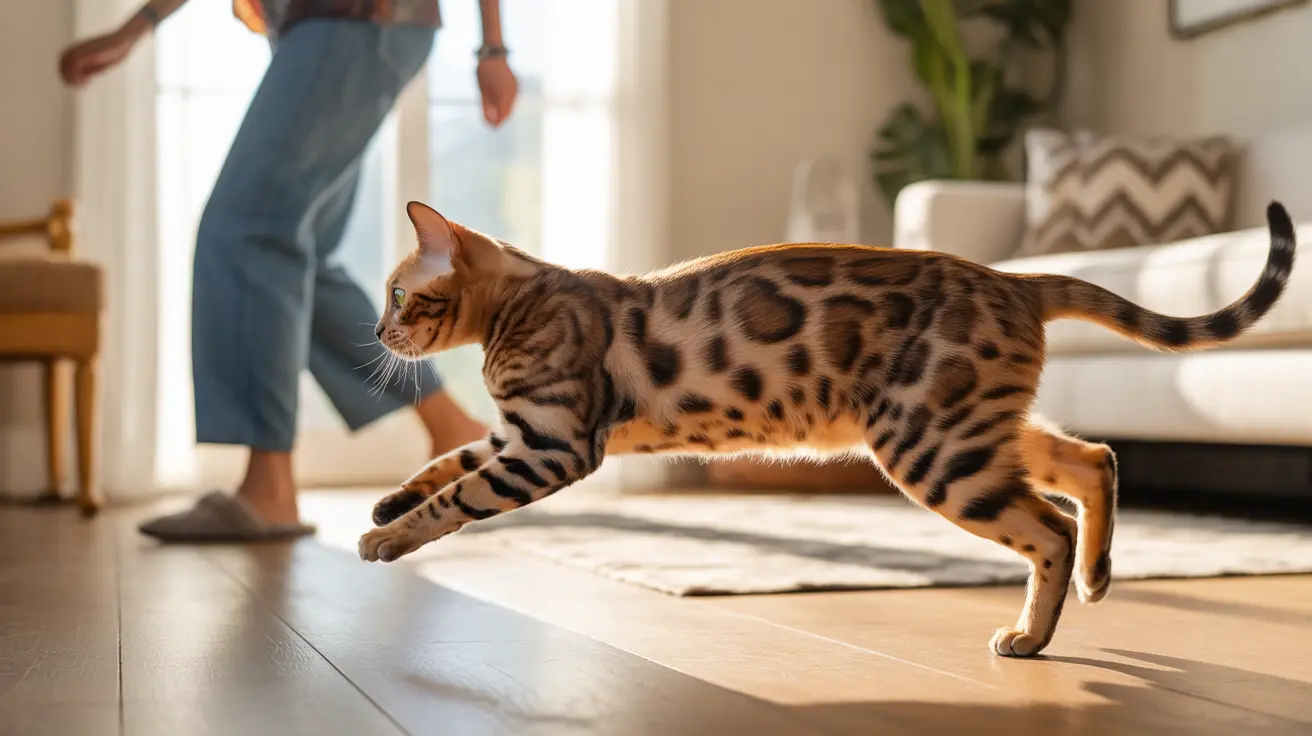The Natural Hunting Instinct
Cats are natural predators, and your moving feet can trigger their innate hunting response. When your feet move under blankets or shuffle across the floor, they mimic the movement of small prey animals, making them irresistible targets for your feline hunter.
This behavior is particularly common in younger cats and indoor cats who may have limited outlets for their predatory drive. The combination of movement, size, and unpredictability makes feet perfect practice targets for their hunting skills.
Attention-Seeking Behavior
Many cats learn that biting feet is an effective way to get their owner's attention. Whether you react by jumping, speaking to them, or providing food or play, your response can reinforce this behavior. Cats often target feet when their owners are:
- Walking away from them
- Busy with other activities
- Getting ready for bed or waking up
- Working on computers or phones
Signs of Boredom or Understimulation
Foot-biting can indicate that your cat needs more mental and physical stimulation. Indoor cats especially require regular enrichment to prevent boredom-related behaviors. Signs that boredom might be driving the foot-biting include:
- Increased activity levels before attacks
- Multiple daily "ambush" attempts
- Combining foot attacks with other attention-seeking behaviors
- More frequent biting during quiet periods
Stress and Anxiety Indicators
Sometimes, foot-biting can signal underlying stress or anxiety. Changes in your cat's environment, routine, or social dynamics might trigger this behavior as a coping mechanism. Watch for these accompanying signs:
- More aggressive or forceful bites
- Other changes in behavior or routine
- Increased vocalization
- Changes in eating or litter box habits
How to Address Foot-Biting Behavior
To effectively manage your cat's foot-biting habit, consider implementing these strategies:
Provide Alternative Outlets
- Interactive toys and puzzle feeders
- Regular play sessions with wand toys
- Scratching posts and climbing structures
- Scheduled feeding times to prevent hunger-related aggression
Environmental Enrichment
- Window perches for outdoor viewing
- Cat trees and vertical spaces
- Rotating toy selection to maintain interest
- Safe outdoor experiences (catios or supervised outings)
Frequently Asked Questions
Why does my cat bite my feet when they move around?
Your cat bites moving feet because the motion triggers their natural hunting instinct. Feet moving under blankets or across floors mimic prey movement, making them attractive targets for your cat's predatory behavior.
How can I tell if my cat is biting my feet out of play or stress?
Playful biting is usually gentle and accompanied by other playful behaviors like chasing or pouncing. Stress-related biting tends to be more aggressive, may break skin, and often occurs alongside other stress indicators like hiding or excessive grooming.
What are effective ways to stop my cat from biting my feet?
Redirect their attention to appropriate toys, maintain consistent play sessions, and avoid reinforcing the behavior with dramatic reactions. Ensure your cat has plenty of environmental enrichment and consider using deterrent sprays on slippers or socks.
Could my cat's foot-biting be a sign of a medical problem?
While most foot-biting is behavioral, sudden aggressive biting or significant behavior changes should be evaluated by a veterinarian to rule out medical issues like pain, dental problems, or neurological conditions.
Why do some cats specifically target feet under blankets or in socks?
Feet under blankets or in socks appear more like prey animals to cats, with the movement and texture triggering their hunting instinct. The concealment aspect also adds to the excitement of the "hunt."
Conclusion
While cat foot-biting can be frustrating, understanding its root causes helps address the behavior effectively. Most cases are normal expressions of feline instincts and can be managed through proper enrichment, play, and consistent training. If the behavior becomes aggressive or concerning, consult with your veterinarian to ensure there aren't underlying health issues at play.






